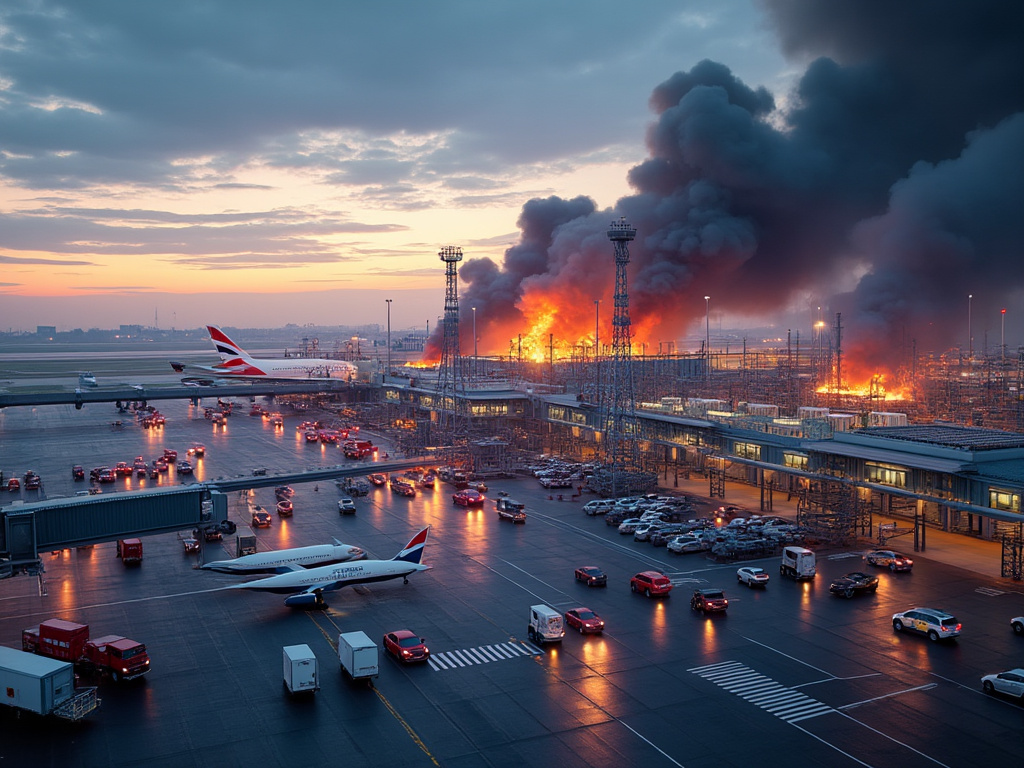
Heathrow Airport Closure Due to Substation Fire Causes Major Disruption
Significant power outage following a fire at an electrical substation affects thousands of flights and passengers worldwide.
Heathrow Airport in London, the busiest airport in Europe, was closed on Friday due to a severe power outage caused by a fire at a nearby electrical substation in Hayes, west London.
The incident began late on Thursday evening when a transformer at the substation caught fire, involving approximately 25,000 liters of cooling oil, leading to major hazards due to high-voltage equipment in the vicinity.
London Fire Brigade dispatched approximately 70 firefighters to control the blaze, establishing a 200-meter cordon and evacuating around 150 residents from surrounding areas.
Initial reports indicated that the power outage had resulted from the failure of a backup transformer, which led to a loss of power critical for airport operations.
Heathrow’s Chief Executive, Thomas Woldbye, stated that although the airport has three substations, the backup system also failed, necessitating the closure of the airport as safety procedures required a complete restructuring of the power supply from the unaffected substations.
As a result, the airport announced it would remain closed until 11:59 PM on Friday, leading to the cancellation of over 1,000 flights, affecting more than 200,000 passengers.
Airlines such as British Airways, Air Canada, and United Airlines confirmed significant disruptions, with some flights diverted to other European airports, including Gatwick and Shannon.
Early Friday evening, power appeared to have been restored through an interim solution from National Grid, which reported that power had been reconfigured to resupply the areas impacted by the fire.
The airport began resuming operations, prioritizing repatriation flights for stranded passengers.
Despite the restoration of power, officials warned that extensive disruptions would likely continue over the weekend as flight schedules remained affected.
British Airways indicated that the repercussions of the closure would be felt for days, as logistical challenges emerged regarding repositioning aircraft and crew to addresses the backlog of cancelled flights.
Further investigations into the cause of the fire are ongoing, led by the Metropolitan Police's counter-terrorism command, though authorities have stated there is no suspicion of foul play at this time.
The Transport Secretary, Heidi Alexander, acknowledged the unprecedented nature of the incident while emphasizing the rapid response from emergency services.
The incident has raised questions regarding Heathrow's emergency preparedness and resilience, particularly in light of critical infrastructure management.
With Heathrow serving as a vital hub for global air travel and freight, the implications of this disruption extend beyond mere passenger inconvenience to potential impacts on trade and logistics.
Experts within the aviation industry have called the event akin to a significant historical disruption in aviation, highlighting the challenges faced in restoring operations in a timely manner.
As communities in Ireland, where many flights were diverted, expressed their challenges, airlines and airports continue to cooperate closely to manage the fallout from this incident.
Heathrow officials have indicated expectations of a return to normal operations by Saturday, yet the operational landscape remains delicate as recovery processes unfold.
The incident began late on Thursday evening when a transformer at the substation caught fire, involving approximately 25,000 liters of cooling oil, leading to major hazards due to high-voltage equipment in the vicinity.
London Fire Brigade dispatched approximately 70 firefighters to control the blaze, establishing a 200-meter cordon and evacuating around 150 residents from surrounding areas.
Initial reports indicated that the power outage had resulted from the failure of a backup transformer, which led to a loss of power critical for airport operations.
Heathrow’s Chief Executive, Thomas Woldbye, stated that although the airport has three substations, the backup system also failed, necessitating the closure of the airport as safety procedures required a complete restructuring of the power supply from the unaffected substations.
As a result, the airport announced it would remain closed until 11:59 PM on Friday, leading to the cancellation of over 1,000 flights, affecting more than 200,000 passengers.
Airlines such as British Airways, Air Canada, and United Airlines confirmed significant disruptions, with some flights diverted to other European airports, including Gatwick and Shannon.
Early Friday evening, power appeared to have been restored through an interim solution from National Grid, which reported that power had been reconfigured to resupply the areas impacted by the fire.
The airport began resuming operations, prioritizing repatriation flights for stranded passengers.
Despite the restoration of power, officials warned that extensive disruptions would likely continue over the weekend as flight schedules remained affected.
British Airways indicated that the repercussions of the closure would be felt for days, as logistical challenges emerged regarding repositioning aircraft and crew to addresses the backlog of cancelled flights.
Further investigations into the cause of the fire are ongoing, led by the Metropolitan Police's counter-terrorism command, though authorities have stated there is no suspicion of foul play at this time.
The Transport Secretary, Heidi Alexander, acknowledged the unprecedented nature of the incident while emphasizing the rapid response from emergency services.
The incident has raised questions regarding Heathrow's emergency preparedness and resilience, particularly in light of critical infrastructure management.
With Heathrow serving as a vital hub for global air travel and freight, the implications of this disruption extend beyond mere passenger inconvenience to potential impacts on trade and logistics.
Experts within the aviation industry have called the event akin to a significant historical disruption in aviation, highlighting the challenges faced in restoring operations in a timely manner.
As communities in Ireland, where many flights were diverted, expressed their challenges, airlines and airports continue to cooperate closely to manage the fallout from this incident.
Heathrow officials have indicated expectations of a return to normal operations by Saturday, yet the operational landscape remains delicate as recovery processes unfold.










